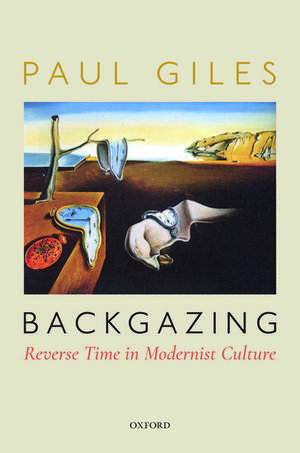Backgazing: Reverse Time in Modernist Culture
Autor Paul Gilesen Limba Engleză Hardback – 4 mar 2019
Preț: 519.46 lei
Preț vechi: 741.55 lei
-30% Nou
Puncte Express: 779
Preț estimativ în valută:
99.41€ • 107.95$ • 83.50£
99.41€ • 107.95$ • 83.50£
Carte disponibilă
Livrare economică 21-27 martie
Preluare comenzi: 021 569.72.76
Specificații
ISBN-13: 9780198830443
ISBN-10: 0198830440
Pagini: 336
Ilustrații: 22 Illustrations
Dimensiuni: 164 x 242 x 26 mm
Greutate: 0.68 kg
Editura: OUP OXFORD
Colecția OUP Oxford
Locul publicării:Oxford, United Kingdom
ISBN-10: 0198830440
Pagini: 336
Ilustrații: 22 Illustrations
Dimensiuni: 164 x 242 x 26 mm
Greutate: 0.68 kg
Editura: OUP OXFORD
Colecția OUP Oxford
Locul publicării:Oxford, United Kingdom
Recenzii
Backgazing: Reverse Time in Modernist Culture by Paul Giles is an erudite and perceptive account of how the literature of Australia and New Zealand entwine with the key texts and ideas of literary and artistic modernism. Its particular value is how it shows, with satisfying weight, the value of both the antipodes and its literature on the global stage.
Backgazing is full of brilliant ideas drawn from Giles's considerable knowledge of early twentieth-century writing across the hemispheres. While few readers will be able to match his breadth of reading, many will find parts of the book illuminating and be persuaded by this new arrangement of twentieth-century world literature and Australian literature's place within it.
Backgazing puts Australia onto the map of global modernism while resurrecting the issue of modernist time for the twenty-first century. It does so with a sweep, an authority, and a scrupulousness of attention that readers have come to expect from the superb work of Paul Giles.
Two of the bravura readings at the centre of this study are of Thomas Mann and Eleanor Dark. It's worth reading this book for these alone...There are many fascinating points of difference with Dark. There is also a fascinating interlude about H.G. Wells, his entanglements with Australia, and his The Conquest if Time (1942), with a fitting preface about Douglas Sirk's 1937 film To New Shores (Zu neuen Ufern)
A first dimension of Giles's argument is to add Australian voices (literary voices, of course, but also critical ones) to the discussion of modernism, so that such figures as Joseph Furphy, R. D. FitzGerald, Kenneth Slessor, H. H. Richardson, Eleanor Dark, and James Farrell (among others) enter the analysis alongside much more familiar modernists...Giles is a superb critic, and he brings these works into full literary life, making the case for their interest and value in their own right, and even more in a rich dialogue with modernists who are more widely known.
Backgazing is full of brilliant ideas drawn from Giles's considerable knowledge of early twentieth-century writing across the hemispheres. While few readers will be able to match his breadth of reading, many will find parts of the book illuminating and be persuaded by this new arrangement of twentieth-century world literature and Australian literature's place within it.
Backgazing puts Australia onto the map of global modernism while resurrecting the issue of modernist time for the twenty-first century. It does so with a sweep, an authority, and a scrupulousness of attention that readers have come to expect from the superb work of Paul Giles.
Two of the bravura readings at the centre of this study are of Thomas Mann and Eleanor Dark. It's worth reading this book for these alone...There are many fascinating points of difference with Dark. There is also a fascinating interlude about H.G. Wells, his entanglements with Australia, and his The Conquest if Time (1942), with a fitting preface about Douglas Sirk's 1937 film To New Shores (Zu neuen Ufern)
A first dimension of Giles's argument is to add Australian voices (literary voices, of course, but also critical ones) to the discussion of modernism, so that such figures as Joseph Furphy, R. D. FitzGerald, Kenneth Slessor, H. H. Richardson, Eleanor Dark, and James Farrell (among others) enter the analysis alongside much more familiar modernists...Giles is a superb critic, and he brings these works into full literary life, making the case for their interest and value in their own right, and even more in a rich dialogue with modernists who are more widely known.
Notă biografică
Paul Giles is Challis Chair of English at the University of Sydney and has taught at the Universities of Nottingham, Cambridge, Oxford, and Portland State. Previously, he served as Director of the Rothermere American Institute at Oxford (2003-2008) and as President of the International American Studies Association (2005-2007).
